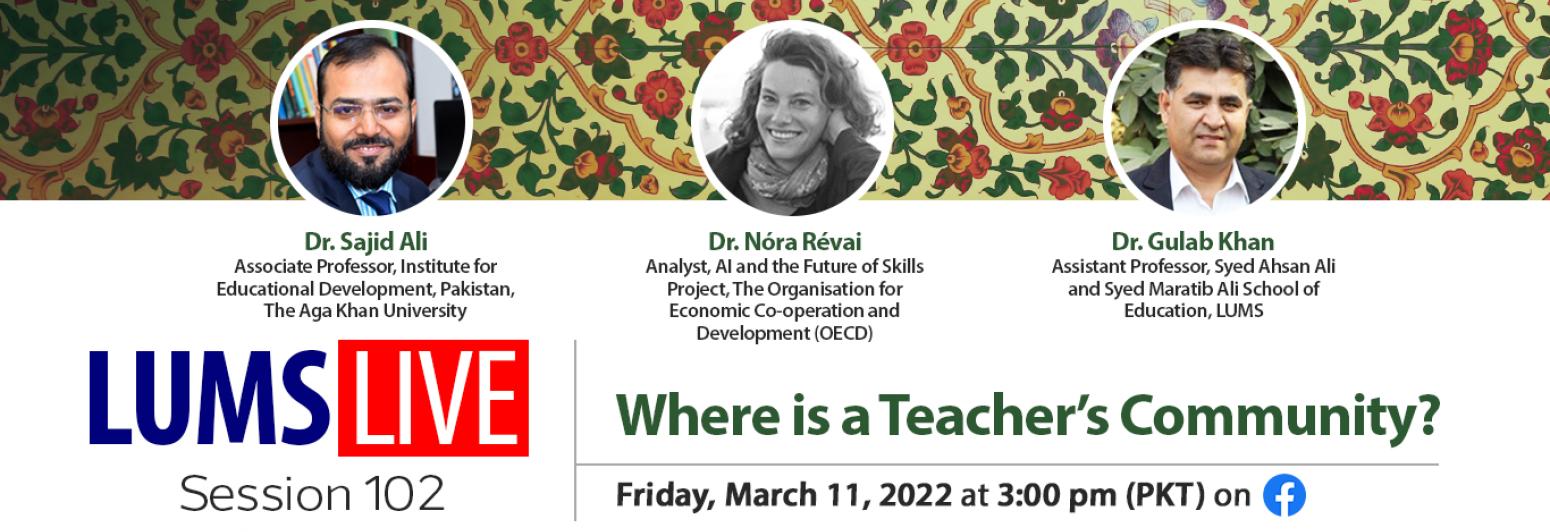
March 11, 2022
Teachers in Pakistan spend 90 percent of time in the classroom, whereas in developed educational systems teachers spend 60 -70 percent of their working time in the classroom and 30-40 percent of time in non-teaching activities to improve instruction. What is the significance of non-teaching communal activities to the continuous professional learning of teachers in schools, and why?
This webinar explores the identification, construction and inevitable transformation of spaces through which teachers define themselves and their learning environments. The session will reflect on the opportunities and challenges experienced through processes of collaborative learning, mentoring, and communities of practice (whether online or in-person).
When a teacher asks, where is my community and why do I need one, are they taking the first steps towards professional development and their school’s improvement? Where are the spaces and opportunities for teachers to exercise their agency and to form a professional (individual and collective) identity with the ultimate objective of enhancing their practice? What forms, if at all, do those spaces take in the education ecosystem in Pakistan? Does the public or private sector do it better when it comes to in-service continuous professional learning of teachers? What are the global lessons for Pakistan in that regard?
Hosted in collaboration with the Syed Ahsan Ali and Syed Maratib Ali School of Education and the Mahbub ul Haq Research Centre (MHRC), the session will be moderated by Dr. Gulab Khan.
Join us for this interesting conversation!
About the Panelists
Dr. Sajid Ali
Dr. Ali holds a PhD in Education Policy Studies from the University of Edinburgh, an MEd in Leadership and Policy from Monash University, and a Masters in Sociology from the University of Karachi. He is the recipient of various awards including: A.R. Kiyani Gold Medal – 1997, Australian Development Award – 2003, Commonwealth Youth Leadership Award – 2003, Edinburgh Research Award – 2006, South Asian Visiting Fellowship at Oxford – 2011 and Australian Alumni Excellence Award - 2014. Dr. Ali has also taught at Hamdard University, Karachi University and University of Edinburgh. He is the General Secretary of Pakistan Association for Research in Education (PARE). His research interests include globalisation and education policy, new forms of educational governance, policy networks, education reforms, privatisation of education and role of knowledge resources in shaping policy. Dr. Ali is a key member of various policy forums at national and provincial levels. He has contributed in the formation of various government policies: National Education Policy 2009; Teacher Licensing Policy; Sindh Education Sector Plan; Public Private Partnership Act, Non-Formal Education Policy of Sindh 2018 etc.
Dr. Nóra Révai
Dr. Révai is leading the OECD's Strengthening the Impact of Education Research project and in recent years, played a key role in developing the OECD’s Teacher Knowledge Survey. Her research and policy interests include teacher education, social processes and knowledge dynamics in policy and practice, and networks and leadership. Before joining the OECD, she was managing EU-funded international projects on school leadership at the Hungarian National Agency for European cooperation programmes in education. She has also worked as a secondary school teacher. Dr. Révai holds an MSc in Mathematics and a BA in English Teaching from Eötvös Loránd University, Hungary, and a PhD in Sociology from the University of Strasbourg, France.
Dr. Gulab Khan
Dr. Khan acquired his PhD in 2013 in educational theory and policy from the College of Education, Pennsylvania State University, United States. He holds an MSc degree in chemistry and an MEd degree in educational leadership and management. With over 20 years’ experience in the field of education (K through higher education) in both private and public sectors, his professional journey in education dates back to 1999 when he joined the Aga Khan Education Service, Pakistan (AKES,P), a subsidiary of the Aga Khan Development Network (AKDN) as a substitute lecturer of Chemistry. In 2015, he switched to higher education as an Assistant Professor at the University of Swat, a public sector university in Khyber Pakhtunkhwa, where he also assumed additional portfolio as the Director Advance Studies. In 2017, he moved to the National University of Sciences and Technology (NUST) in Islamabad after which he joined LUMS in 2018. His research interests intersect at the nexus of education policy and practice on issues related to teacher quality, supervision, teacher status, educational leadership, and school improvement.



















